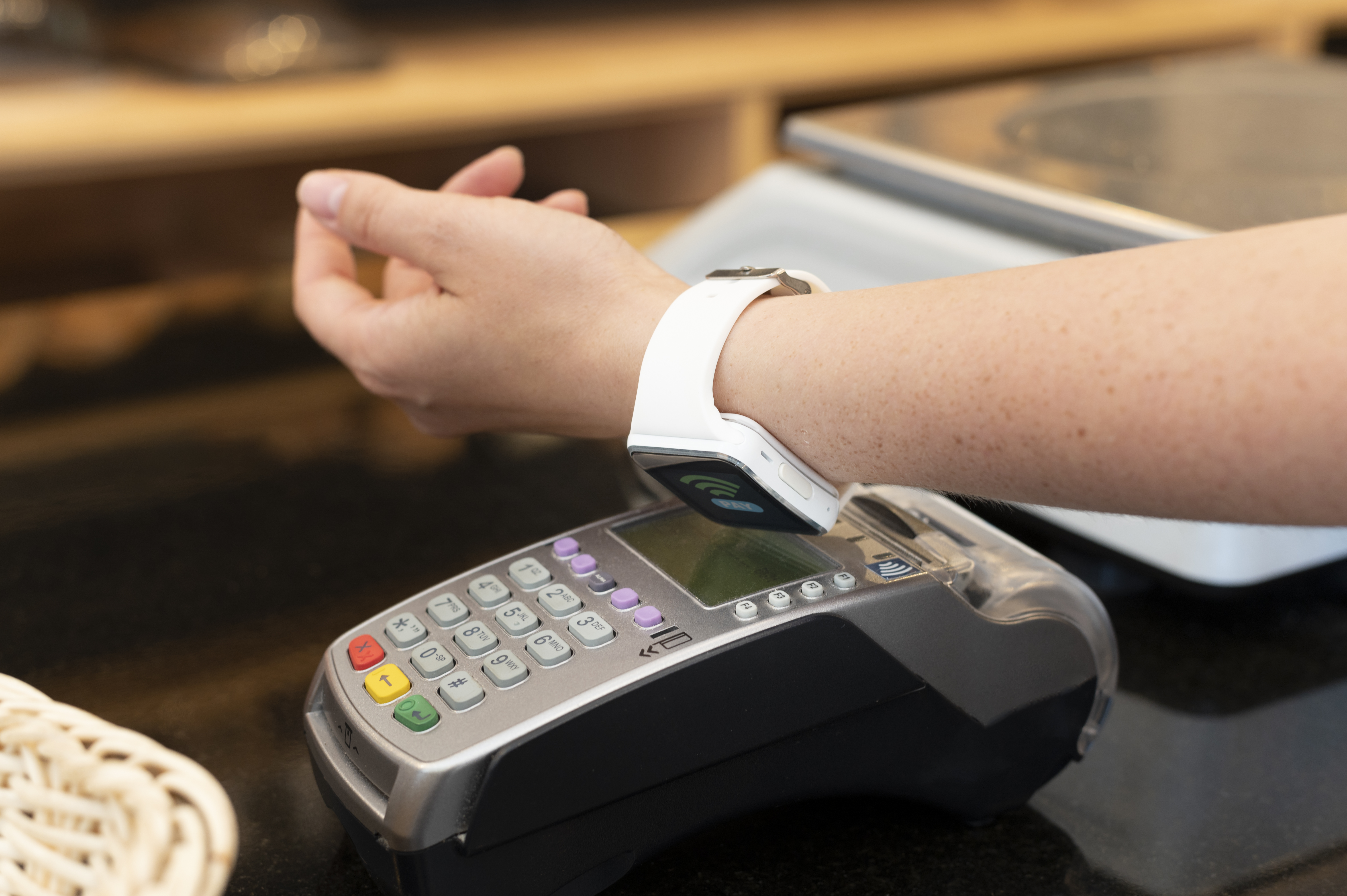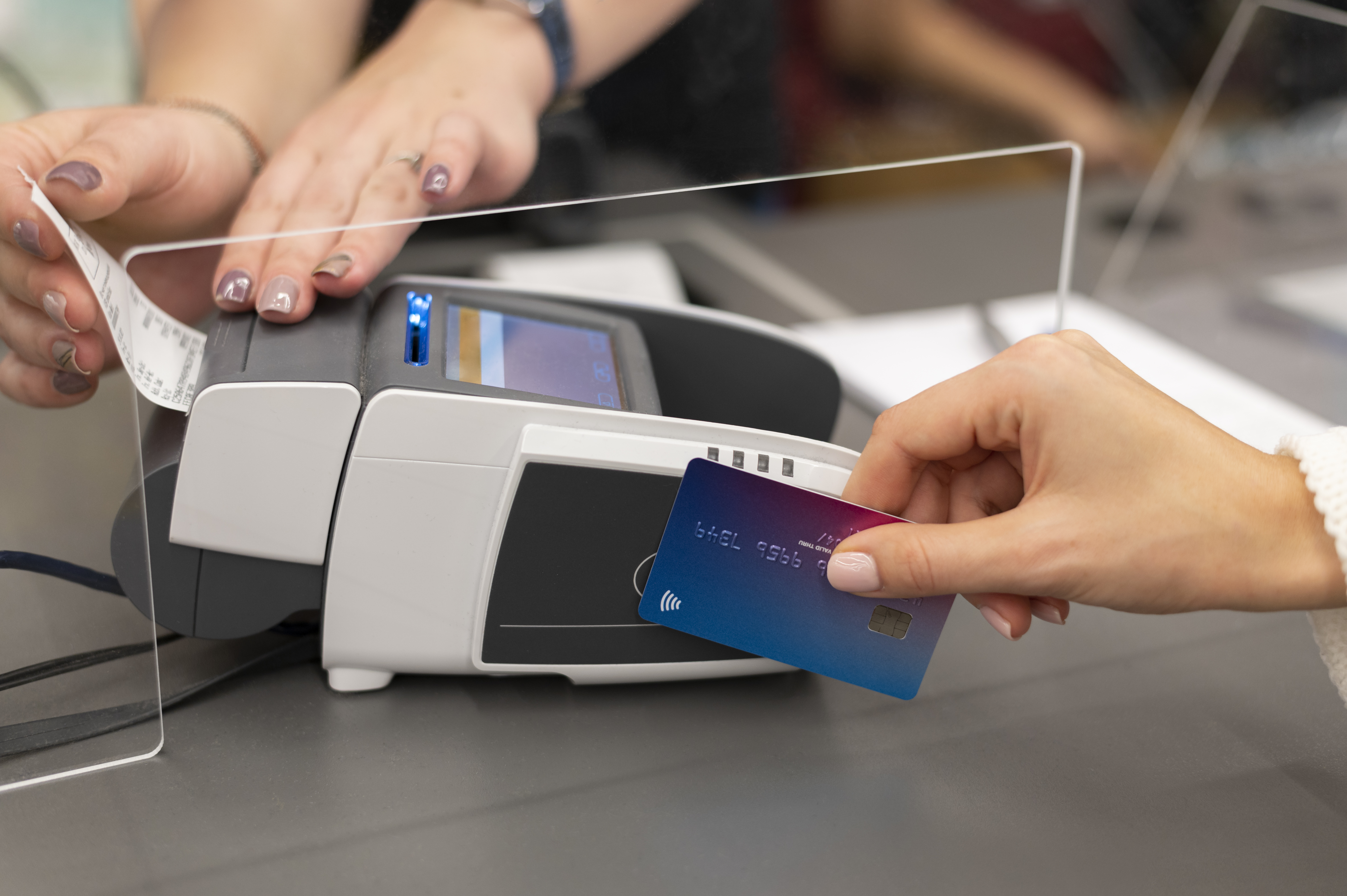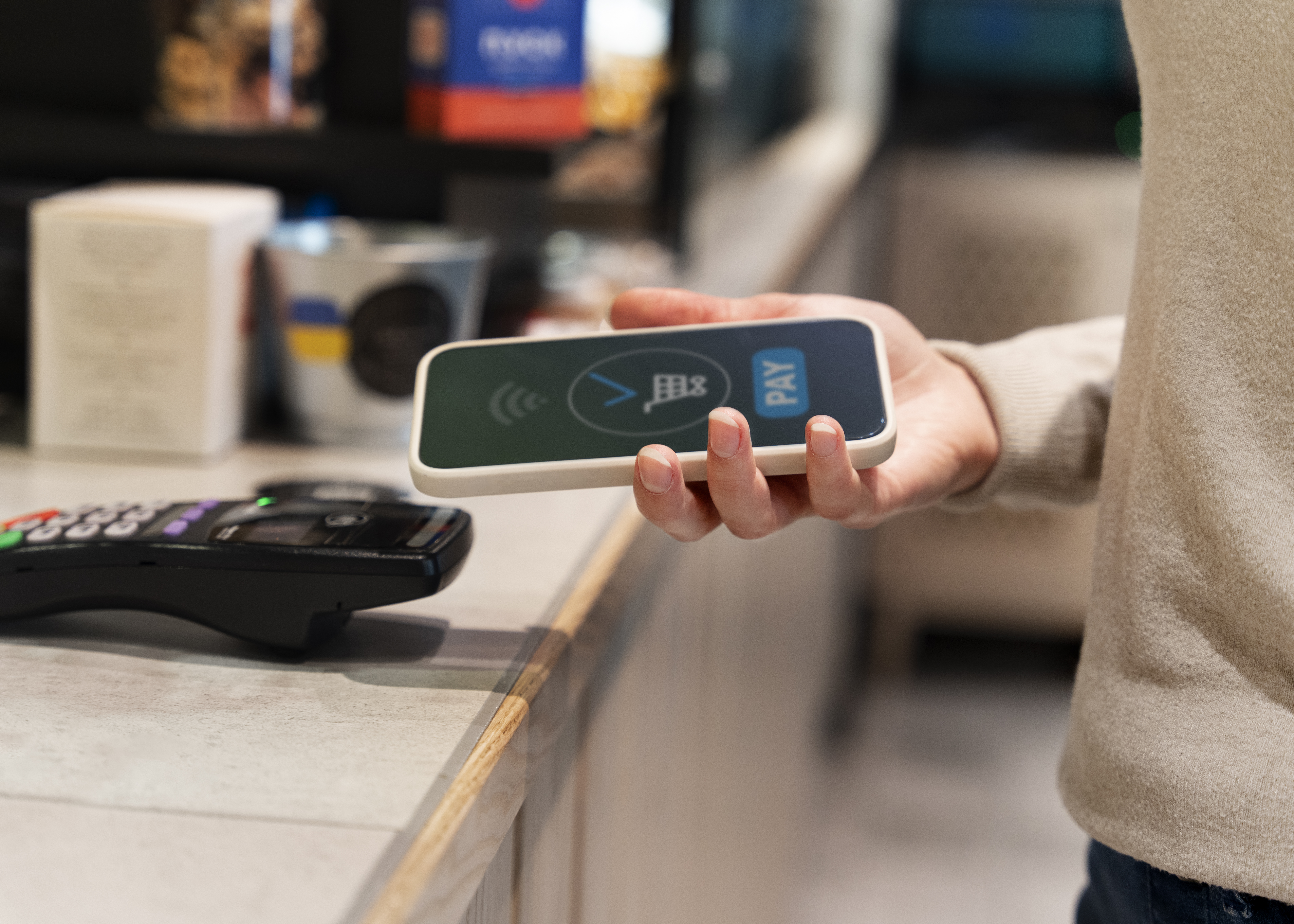Our Blogs
Gone are the days of clunky cash registers and mountains of paper receipts. In today’s dynamic retail landscape, a robust point of sale (POS) system is no longer a luxury but a necessity. These comprehensive software solutions streamline your entire sales process, from when a customer walks in when they pay and leave.
Choosing the right POS system becomes crucial as business owners strive to enhance customer experience and operational efficiency. Modern POS systems offer more than just transaction processing; they integrate inventory management, customer relationship management, and advanced analytics to help you make informed business decisions.
This guide explores the world of POS systems, their functionalities, their benefits, and how they can transform retail operations.

The Evolution of POS Systems
The point of sale has come a long way from simply processing transactions. Modern POS systems are comprehensive software solutions that integrate seamlessly with various hardware components. A typical setup might include a POS terminal (a tablet or computer), a receipt printer, a cash drawer, and a barcode scanner. These systems go beyond just ringing up sales; they empower you to manage inventory, track sales data, analyze customer data, and gain valuable insights into your business performance.
Modern POS systems are software-driven solutions that encompass a wide range of functionalities, including:
- Inventory Management: Ditch the manual spreadsheets! Modern POS systems offer real-time inventory tracking, low-stock alerts, and automated purchase orders, saving you valuable time and minimizing stockouts.
- Sales Reporting and Data Analysis: Comprehensive sales reporting can provide invaluable insights into your business performance. You can analyze sales trends, identify top-performing products, and make informed decisions to optimize your pricing and marketing strategies.
- Customer Relationship Management (CRM): Modern POS systems allow you to capture and track customer data, including purchase history and preferences. This empowers you to personalize marketing campaigns, implement targeted loyalty programs, and foster stronger customer relationships.
- Mobile POS Systems: Embrace flexibility with a mobile POS system. These solutions allow you to process transactions anywhere on the shop floor, enhancing customer interactions and reducing wait times.
- Payment Processing: Accept numerous payment methods, including credit cards, debit cards, and contactless payments like Apple Pay and Google Pay, and even integrate with gift card programs, offering customers a convenient and secure checkout experience.
- Employee Management: Simplify employee scheduling, track work hours, and manage permissions within your POS system.
Legacy POS systems, often limited in functionality, cannot compete with the power and flexibility offered by modern solutions. Upgrading to a new POS system can streamline your operations, boost efficiency, and unlock valuable insights to drive your business forward.

Cloud Power: The Rise of Cloud-Based POS Systems
Forget clunky, on-premise software installations. Cloud-based POS systems are the future, offering unparalleled flexibility and scalability. These systems store your data securely in the cloud, accessible from any internet-connected device. This allows you to manage your business remotely, perfect for companies with multiple locations. Additionally, cloud-based POS systems are constantly updated, ensuring you always have access to the latest features and security patches.
The rise of cloud-based POS systems has revolutionized the way businesses operate. Unlike traditional, on-premise systems that require hefty upfront investments and complex installation, cloud-based solutions offer a host of advantages:
- Scalability: Cloud-based POS systems are incredibly scalable. As your business grows, you can easily add new features or users without worrying about hardware upgrades.
- Accessibility: Access your POS software from anywhere, anytime, using any internet-connected device. This allows you to manage your business remotely and monitor operations in real-time.
- Security: Cloud providers offer robust security measures to protect sensitive business data. Automatic backups and disaster recovery features ensure your data is always safe.
- Integration: Cloud-based POS systems seamlessly integrate with various peripherals, such as barcode scanners, enhancing the efficiency and accuracy of sales transactions and inventory management.
Popular POS System Providers
With countless POS providers vying for your attention, selecting the best fit requires careful consideration. Here’s a glimpse into three industry leaders offering diverse solutions:
Square
A popular choice for small businesses, Square offers a user-friendly and affordable POS system. Their solution includes a free mobile app that transforms a tablet or smartphone into a mobile POS system, perfect for on-the-go sales or pop-up shops. Square excels in its simplicity and ease of use, making it an excellent option for businesses starting with POS technology.
Shopify
Renowned for its user-friendly e-commerce platform, Shopify boasts a powerful point-of-sale POS solution that is seamlessly integrated with its online store. This makes it ideal for businesses with a brick-and-mortar presence and an online store, streamlining inventory management and customer data across both platforms.
Lightspeed
Catering to a broader range of businesses, Lightspeed offers a comprehensive POS system packed with advanced features. Their solution integrates seamlessly with popular accounting software and provides robust tools for managing multiple locations, employee schedules, and loyalty programs. Lightspeed is ideal for businesses seeking a scalable and feature-rich POS system to streamline their operations.

The Role of Modern POS Systems in Enhancing Business Efficiency
Modern POS systems have evolved beyond traditional cash registers, incorporating features that significantly enhance business efficiency and customer satisfaction. Here are some key areas where modern point-of-sale systems excel:
Streamlined Payment Processing
Modern POS systems support various payment methods, including mobile payments like Google Pay and Apple Pay, credit and debit cards, and even gift cards. This flexibility ensures businesses can cater to their customers’ diverse payment preferences, leading to a smoother checkout process and increased sales.
Enhanced Customer Data Management
POS systems with integrated customer data management capabilities allow businesses to track customer interactions, purchase history, and preferences. This information can be used to personalize marketing efforts, create targeted promotions, and improve customer loyalty programs. By better understanding their customers, businesses can enhance their shopping experience and drive repeat business.
Efficient Inventory Management
Effective inventory management is crucial for retail stores. Modern POS systems offer real-time inventory tracking, automated stock updates, and advanced reporting tools. These features help businesses maintain optimal stock levels, reduce carrying costs, and minimize the risk of stockouts or overstocking. Additionally, integrating inventory management with sales data allows businesses to make informed purchasing decisions and improve their supply chain efficiency.
Comprehensive Sales Reporting
Accurate and detailed sales reporting is essential for understanding business performance and strategic decisions. Modern POS systems provide various reporting tools that offer insights into sales trends, employee performance, and inventory levels. By analyzing this data, businesses can identify areas for improvement, optimize their operations, and develop strategies to increase profitability.
Improved Customer Experience
A seamless and efficient checkout process is vital to a positive customer experience. Modern POS systems are designed to minimize wait times, reduce errors, and offer multiple payment options. Additionally, features such as digital or printed receipts, customer loyalty programs, and personalized promotions contribute to a more engaging and satisfying shopping experience.
Invest in Your Success with a Modern Point of Sale System
Modern point-of-sale systems are essential for small businesses looking to improve efficiency, enhance customer experiences, and increase profitability. Providers like Shopify, Square, and Lightspeed offer comprehensive POS solutions catering to retail businesses’ diverse needs.
By investing in a modern POS system, companies can streamline their operations, gain valuable insights from sales data, and deliver a superior customer experience. Whether upgrading from a legacy POS system or implementing a new one for the first time, the benefits are clear: increased efficiency, better inventory management, and a more engaging customer shopping experience.
Selecting the best POS system for your business is a critical decision that can impact your operational efficiency, customer experience, and overall success. With numerous POS providers offering a variety of POS systems, it can be challenging to identify the right fit for your specific needs.
Each POS system offers unique features and benefits tailored to different types of businesses. Understanding the strengths and capabilities of each POS system can help you make an informed choice that aligns with your business goals. A POS provider can meet your requirements if you need advanced e-commerce integration, industry-specific tools, or a flexible and affordable solution. Let’s delve into the features and benefits of Shopify, Toast, and Square to help you find the best POS system for your business.

Shopify POS is widely regarded as one of the most comprehensive POS systems available, particularly for businesses that already use Shopify’s e-commerce platform. It seamlessly integrates online store and physical retail operations, making it a popular choice among retail companies.
Integration with Shopify E-commerce
Shopify stands out for its seamless integration with Shopify’s e-commerce platform. This allows retailers to manage online and in-store sales from a single dashboard, simplifying inventory management and sales reporting. Whether you are tracking online sales or in-store purchases, Shopify POS offers a unified solution that enhances operational efficiency.
Customizable Hardware and Software
With Shopify, you can choose from various POS hardware options, including receipt printers, barcode scanners, and card readers. The POS software is equally customizable, allowing you to tailor the interface to your business needs. The system’s flexibility makes it an excellent choice for small businesses looking to grow.
Advanced Features for Retail Businesses
Shopify POS includes advanced customer management tools like customer relationship management and loyalty programs. These features help businesses better understand their customers and provide valuable insights into buying behaviors. The system also supports payment and credit card processing services, ensuring secure and efficient transactions.
Toast
Toast POS is designed for the food service industry, making it an ideal choice for food and beverage businesses. It offers a range of specialized features that cater to the unique needs of restaurants, cafes, and bars.
Industry-Specific Tools
Toast includes tools for table management, online ordering, and automated client notifications. These features streamline operations and enhance customers’ dining experience. For instance, the table management feature allows staff to manage seating and orders efficiently, reducing wait times and improving service quality.
Integrated Payments and Hardware
Toast offers integrated payments and supports various third-party payment processors. This flexibility ensures businesses can choose the most cost-effective and efficient payment solutions. The system also provides robust POS hardware, including cash registers and kitchen display systems, essential for maintaining smooth operations in a busy restaurant environment.
Comprehensive Reporting and Insights
Toast excels in providing detailed sales reporting and inventory tracking. These capabilities help restaurant owners track sales data and manage inventory levels effectively. The system’s reporting tools offer insights into sales trends and customer preferences, enabling businesses to make data-driven decisions.
Square
Square is known for its versatility and ease of use, making it a popular choice for many businesses, from retail stores to service providers. Its simplicity and affordability make it accessible to companies of all sizes.
Ease of Setup and Use
Square is renowned for its user-friendly interface and straightforward setup process. This makes it an excellent choice for small businesses that need a reliable POS system without a steep learning curve. The system’s intuitive design ensures staff can quickly learn to operate it, reducing training time and costs.
Robust Features for Small Businesses
Despite its simplicity, Square offers a range of powerful features, including inventory tracking, employee management, and customer data management. These tools help businesses streamline their operations and improve overall efficiency. The system also supports unlimited POS logins, ensuring all employees can access the tools needed to perform their duties.
Flexible Payment Processing
Square supports various payment methods, including credit and debit cards, mobile payments, and gift cards. The system’s credit card processing services are secure and efficient, minimizing transaction times and enhancing the customer experience. Additionally, Square’s transparent pricing and low transaction fees make it an attractive option for businesses on a budget.

Comparing the Best POS Systems
When evaluating POS systems, it is essential to consider how well they align with your unique business needs. Shopify, Toast, and Square offer unique advantages catering to different industries and operational requirements.
Shopify: Best for Retail Businesses
Shopify is an excellent choice for retail businesses that need a comprehensive POS system with robust e-commerce integration. Its advanced POS features and customizable POS hardware are ideal for managing online sales and in-store transactions. Additionally, Shopify supports various peripherals, including a receipt printer, enhancing its functionality for retail operations.
Toast: Best for Food and Beverage Businesses
Toast is specifically designed for the food service industry. It offers specialized tools for table management, online ordering, and inventory tracking. Its integrated payment processing and comprehensive reporting capabilities make it a standout choice for restaurants and cafes.
Square: Best for Small and Diverse Businesses
Square is versatile and easy to use, making it suitable for many businesses, including retail stores, service providers, and small businesses. Its flexible payment options, robust features, and low costs make it attractive for companies seeking an affordable yet powerful point-of-sale system.
How to Make the Right Choice in Selecting the Best POS System
Choosing the right POS system depends on your business’s needs and industry. Whether you need advanced e-commerce integration, specialized restaurant tools, or a flexible and affordable solution, there is a POS provider that fits your requirements.
1. Assess Your Business Needs
Before selecting a POS system, evaluate your business’s unique needs. Consider factors such as the type of products or services you offer, the volume of transactions, and the level of customer interaction. This assessment will help you identify the key features that are most important for your operations.
2. Explore Free Trials and Demos
Many POS providers offer free trials or demos of their systems. Take advantage of these opportunities to test the POS software and hardware in real-time. This hands-on experience will help you better understand the system’s performance and whether it meets your business needs.
3. Seek Expert Advice
If you are still determining which POS system is best for your business, consider seeking advice from industry experts or other business owners. Their insights and experiences can provide valuable guidance and help you make an informed decision.

Discover the Ideal POS System for Your Business Today
The best POS system is a cornerstone for operational efficiency, empowering you to track sales, manage inventory effectively, and cultivate loyal customers. By prioritizing your business needs and carefully evaluating POS features offered by different providers, you will be well-equipped to choose the right POS system that unlocks significant growth for your retail and restaurant businesses.
Remember, the best POS system is the one that perfectly aligns with your unique business goals and propels you toward long-term success. By considering your specific needs and exploring the features of each retail POS system, you can find the ideal solution for your business.
Small businesses need a robust, versatile solution to streamline operations, manage sales, and gain valuable customer insights. Enter the point-of-sale (POS) system, a technological marvel that goes far beyond processing payments.
A POS system is your business’s central hub, managing everything from inventory tracking to customer relationship management (CRM). It allows you to process payments seamlessly, track inventory in real-time, and generate detailed sales reports to better understand your business performance. However, given the many options available, finding the best POS system for your small business can feel overwhelming.
This blog will equip you with the knowledge to make an informed decision. We will delve into what makes a POS system ideal for small businesses and explore some of the top contenders in the market.

Understanding Your Business Needs
Before diving into specific systems, take a step back and thoroughly self-assess your business. Here are some key questions to ask yourself:
- What type of business do I have? (Retail store, restaurant, service industry) Consider the specific needs of your industry. For example, a restaurant POS system will prioritize menu and table management, while a retail POS system will excel at features like barcode scanning and sales tax calculations.
- What is the volume of my transactions? (High, medium, low) The volume of your transactions will influence the processing fees you incur and the level of functionality you require. You will likely need a robust system with robust payment processing capabilities if you have a high transaction volume.
- Do I need advanced features? (Inventory tracking, online ordering, employee management) Make a list of the features that are crucial for your business operations. Do you need a system with advanced inventory tracking capabilities to manage an extensive product catalog? Is online ordering a key component of your sales strategy? Do you have multiple employees who need to be managed and scheduled?
- Do I have a physical store or operate online? (Or both!) If you have a brick-and-mortar store, look for a POS system with features like in-store pickup and loyalty programs. If you operate exclusively online, consider a POS system that integrates seamlessly with your e-commerce platform.
- What is my budget for a small business POS system? (Monthly fee vs. transaction fees) POS systems come with a variety of pricing structures. Some offer a monthly fee with unlimited transactions, while others charge a transaction fee on each sale. Consider your budget and transaction volume to determine your business’s most cost-effective pricing model.
Lightspeed
Lightspeed POS specializes in serving small businesses within the retail and restaurant industries with tailored solutions that enhance customer management and operational efficiency. Ideal for small business owners managing multiple locations, Lightspeed POS offers robust inventory management capabilities and customer loyalty programs that drive repeat sales.
For retailers and restaurant owners looking to integrate e-commerce tools with their in-store operations seamlessly, Lightspeed POS provides a scalable cloud-based POS system. It supports custom pricing and employee management and even integrates with third-party apps to extend functionality based on specific business needs.
Square
Square POS has carved a niche by offering a comprehensive POS solution catering to diverse small business needs. Square POS covers everything from retail stores requiring intuitive inventory tracking to restaurants needing efficient menu management and online ordering. Its mobile POS system and user-friendly POS software make it a favorite among small business owners seeking flexibility and ease of use.
One standout feature of Square POS is its transparent transaction fees and competitive processing fees, which are crucial for small businesses managing tight budgets. The platform also supports integrated payments and offers detailed sales reports that empower business owners with actionable insights for strategic decision-making.
For small business owners venturing into online stores and physical retail, Shopify POS emerges as a versatile POS system. Known for its seamless integration with Shopify’s e-commerce platform, this cloud-based POS system allows businesses to manage online transactions and in-store operations from a single dashboard. Whether selling through multiple sales channels or needing advanced inventory management, Shopify POS offers scalable solutions tailored to your business needs.
Shopify POS excels in customer management, offering integrated tools for customer loyalty programs and customer relationship management tools. This ensures small businesses can nurture customer relationships effectively, leveraging data analytics for targeted marketing campaigns and personalized customer loyalty incentives.
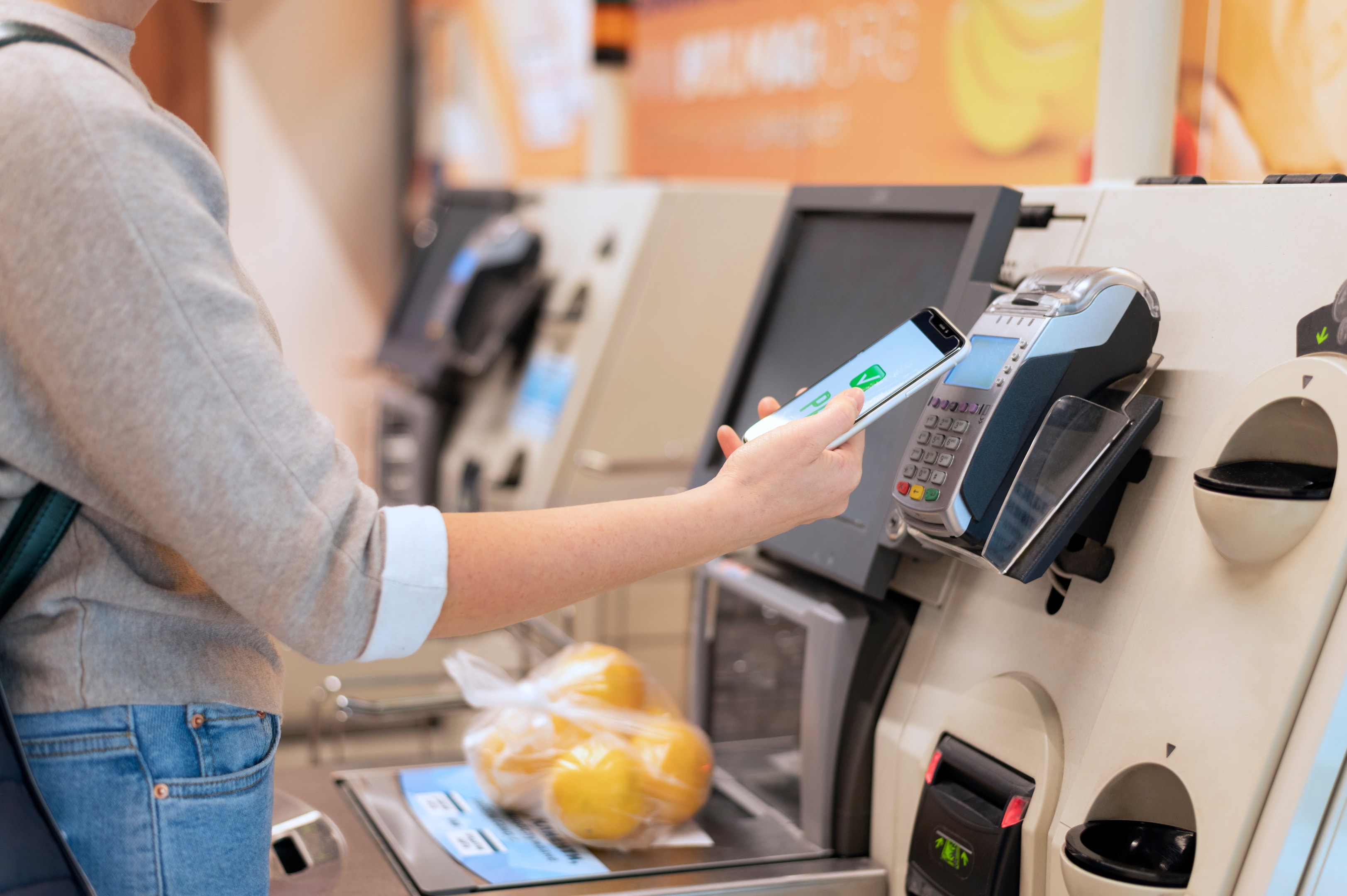
Future Trends in POS Systems for Small Businesses
POS systems for small businesses are poised to advance technologically and enhance customer engagement, adapting to meet evolving business needs effectively. Here are some POS systems trends to watch out for:
Integration with AI and Machine Learning
POS systems increasingly integrate AI-powered features to offer predictive analytics, personalized recommendations, and automated customer service, enhancing customer engagement and operational efficiency.
Mobile and Contactless Payments
As consumer preferences shift towards mobile and contactless payments, many POS systems evolve to support these technologies seamlessly, offering convenience and security for in-store and online transactions.
Enhanced Data Security
With the rise in cyber threats, POS systems focus more on robust data security measures, including encryption and tokenization, to protect customer data and ensure compliance with regulatory requirements.
IoT Integration
IoT-enabled POS systems are emerging, allowing small businesses to connect various devices and sensors for real-time inventory tracking, customer behavior analysis, and operational insights.
Personalization and Customer Experience
Future POS systems will emphasize deeper customer insights and personalization capabilities, enabling small businesses to deliver tailored experiences and build stronger customer relationships.

Investing in Your Success with the Right Small Business POS Systems
Equipping your small business with the right POS system is an investment in efficiency, customer satisfaction, and your bottom line. By understanding your specific needs and exploring the features of leading POS solutions, you can empower your business to thrive in today’s dynamic marketplace.
Whether you prioritize seamless online and in-store integration with Shopify, versatile payment solutions with Square, or tailored retail and hospitality solutions with Lightspeed, consider how these systems compare to other POS systems and align with your business objectives.
Remember, a POS system is more than just a point of sale. It is a powerful tool that can transform small business operations, unlocking valuable data and insights to fuel growth. Furthermore, staying informed about future trends and leveraging the right POS system allows you to position your small business for continued growth and success in an evolving marketplace.
Between managing staff, maintaining inventory, and ensuring a seamless customer experience, keeping your operation running smoothly can feel like an Olympic feat. That’s where a restaurant POS system (point of sale) comes in – your trusty digital sous chef, streamlining processes and taking the guesswork out of day-to-day tasks.
But with numerous restaurant POS systems available, choosing the best one for your unique business can be overwhelming. Fear not, fellow restaurateur! This comprehensive guide will equip you with the knowledge to navigate the exciting world of POS solutions and select the perfect fit.

Understanding Restaurant POS Systems
A restaurant POS system (point-of-sale) is more than just a cash register. It is a comprehensive tool that helps manage every aspect of your restaurant business, from processing sales to tracking inventory and analyzing customer preferences.
Gone are the days of manual calculations and paper receipts. A good restaurant POS system automates these tasks, freeing you to focus on what truly matters – creating a thriving restaurant business. Investing in the best restaurant POS system can transform your operations, ensuring efficiency, accuracy, and enhanced customer satisfaction throughout your establishment.
What to Consider When Choosing the Best Restaurant POS System
Before diving into specific features, take a step back and consider your restaurant’s particular needs. Here are some key factors to ponder:
Restaurant Concept
Are you a quick-service restaurant (QSR) with high order volume, a fine dining establishment, a food truck, or something in between? Different concepts require varying functionalities in their restaurant POS system.
Functionality
A good restaurant POS system should offer comprehensive inventory management, efficient online ordering, and seamless integration with kitchen display systems. These features are vital for managing orders efficiently and ensuring timely service.
Budget
Restaurant POS systems come with monthly fees, upfront costs for hardware options, and processing fees for credit card transactions. Consider your budget limitations while considering the potential return on investment (ROI) an excellent system can provide.
Scalability
If you envision expanding your restaurant business, choose a POS system to grow with you. Look for systems that support multiple locations and offer features like team management for managing staff across different outlets.
Ease of Use
A user-friendly interface is crucial, especially for restaurants with high employee turnover. Cloud-based POS systems are often easier to learn and use than traditional desktop-based systems.
Customization
Depending on your restaurant concept, look for a POS system that offers custom pricing options, integrates with self-service kiosks, and supports specific hardware options tailored to your needs.
Customer Support
Look for providers that offer 24/7 customer support, proactive troubleshooting, and comprehensive training resources to ensure smooth implementation and ongoing support.

Essential Features of Restaurant POS Systems
Now that you have a clear picture of your restaurant’s needs, let us explore some essential features to look for in a restaurant POS system:
- Inventory Management: Efficient inventory management is paramount for controlling costs and minimizing waste. A good restaurant POS system should track ingredients, generate usage reports, and send out low-stock alerts to ensure you always have what you need to fulfill orders.
- Menu Management: Creating and updating menus should be a breeze. Look for a system that allows for easy menu customization, custom pricing options for happy hour specials or combo meals, and the ability to manage online simultaneously and in-store menus.
- Order Taking and Payment Processing: The core functionality of any restaurant POS system should be seamless order processing and secure payment acceptance. The system should integrate various payment processing options to cater to diverse customer preferences.
- Customer Management: Building a loyal customer base is vital to success. Look for a restaurant POS system with built-in features to track customer data, loyalty programs to reward repeat business, and email marketing tools to keep your patrons engaged.
- Reporting and Analytics: Data is king! Many restaurant POS systems offer robust reporting and analytics tools that allow you to analyze sales trends, identify peak hours, and track employee performance.
- Table Management: Efficiently manage reservations, seating arrangements, and table turnover to enhance guest experience and maximize seating capacity.
- Integration with Third-Party Apps: Ensure compatibility with other tools and platforms such as accounting software, online ordering platforms, and loyalty programs to enhance operational efficiency and customer engagement.
- Employee Management: Simplify scheduling, track labor costs, and manage payroll efficiently to optimize staffing levels and improve employee productivity.
Types of Restaurant POS Systems
Choosing the correct type of POS system for your restaurant is crucial to meeting your operational needs and enhancing customer experience. Here, we explore the differences between traditional and cloud-based POS systems and specialized systems tailored for various restaurant concepts.
Traditional vs. Cloud-Based POS Systems:
- Traditional POS Systems: These are typically hardware-based systems that require on-site installation and maintenance. They are known for their robustness and reliability but may have higher upfront costs.
- Cloud-Based POS Systems: Software-as-a-Service (SaaS) solutions that operate in the cloud, offering flexibility, scalability, and accessibility from any internet-connected device. They often have lower upfront costs and are suitable for multi-location businesses.
Specialized POS Systems:
- Quick Service Restaurants (QSR) POS Systems: Designed for fast-paced environments with features like quick order entry, kitchen display systems, and integration with self-service kiosks.
- Fine Dining POS Systems: Focus on tableside ordering, detailed menu customization, and high-touch customer service capabilities.
- Food Truck POS Systems: Compact, mobile-friendly solutions with robust offline capabilities and integrated payment processing suitable for on-the-go operations.

Explore the Leading Restaurant POS Providers
With many restaurant POS providers vying for your attention, here’s a closer look at three popular options and their unique offerings:
Square
Square has revolutionized restaurant POS systems with its intuitive design and comprehensive features tailored for various food service businesses. Ideal for coffee shops, food trucks, and hotel restaurants, Square’s POS system offers:
- Payment Processing: Seamless credit card processing and payment processing with competitive rates.
- Inventory and Sales Tracking: Monitor sales trends and manage inventory efficiently.
- Marketing and Customer Engagement: Build customer loyalty with integrated marketing tools and feedback mechanisms.
- Self-Service Options: Integrate self-service kiosk solutions to streamline ordering processes.
Square’s POS software and hardware options cater to small businesses and startups, providing a scalable solution with minimal upfront costs.
Shopify extends its e-commerce expertise to brick-and-mortar locations with a robust restaurant POS system. Ideal for businesses looking for a versatile POS system that integrates online and offline operations, Shopify’s POS system offers:
- Customizable Solutions: Tailor your restaurant POS with third-party tools and extensions for specific business needs.
- Multi-Location Management: Centralize operations across multiple sites with unified POS software.
- Integrated Online Ordering: Seamlessly manage orders from your website with Shopify’s POS system.
- Hardware Packages: Choose various hardware options, including tablets and desktop computers, to suit your setup.
Shopify’s restaurant POS system stands out for its flexibility and ease of use, making it a preferred choice for businesses looking to leverage advanced features without complex setups.
Toast
Toast is renowned for its specialized restaurant POS software designed to meet the unique needs of the hospitality industry. Whether you run a quick service restaurant or manage a complex restaurant business with multiple locations, Toast offers a versatile cloud-based POS system that enhances operational efficiency. Key features include:
- Kitchen Display System (KDS): Streamline kitchen operations and improve order accuracy.
- Inventory Management: Track stock levels in real-time to prevent stockouts.
- Customer Experience Tools: Engage loyal customers with integrated marketing tools and online ordering capabilities.
- Team Management: Simplify employee management with shift scheduling and performance tracking features.
Toast stands out for its robust restaurant management software and commitment to customer satisfaction, making it an excellent choice for restaurant owners looking to elevate their operations.
Enhance Efficiency and Upgrade to the Best Restaurant POS Systems
When selecting the best POS system for restaurant owners, consider factors beyond cost, such as software and hardware options, monthly fees, and customer support. A good POS system should align with your specific operational needs, enhance restaurant POS efficiency, and ultimately contribute to your restaurant’s success in the competitive food and beverage market.
Whether you prioritize inventory management and online ordering integration or seek advanced features like kitchen display systems and custom pricing, each POS provider offers unique strengths tailored to various restaurant POS requirements. Investing in a new restaurant POS system empowers your team, satisfies your customers, and paves the way for sustained growth in the dynamic restaurant business landscape.
The retail landscape has undergone a dramatic shift in recent years. The rise of e-commerce giants has forced brick-and-mortar stores to adapt and innovate. The point of sale (POS) system is crucial to this adaptation. These POS systems have transformed from simple cash registers into sophisticated retail POS systems that manage everything from inventory management to payment processing and sales management.
Choosing the right POS software can be daunting for retailers. With numerous cloud-based POS systems, each retail store must consider its unique needs and budget. This blog dives into the top POS systems companies in 2024, highlighting their distinctive features and advantages.
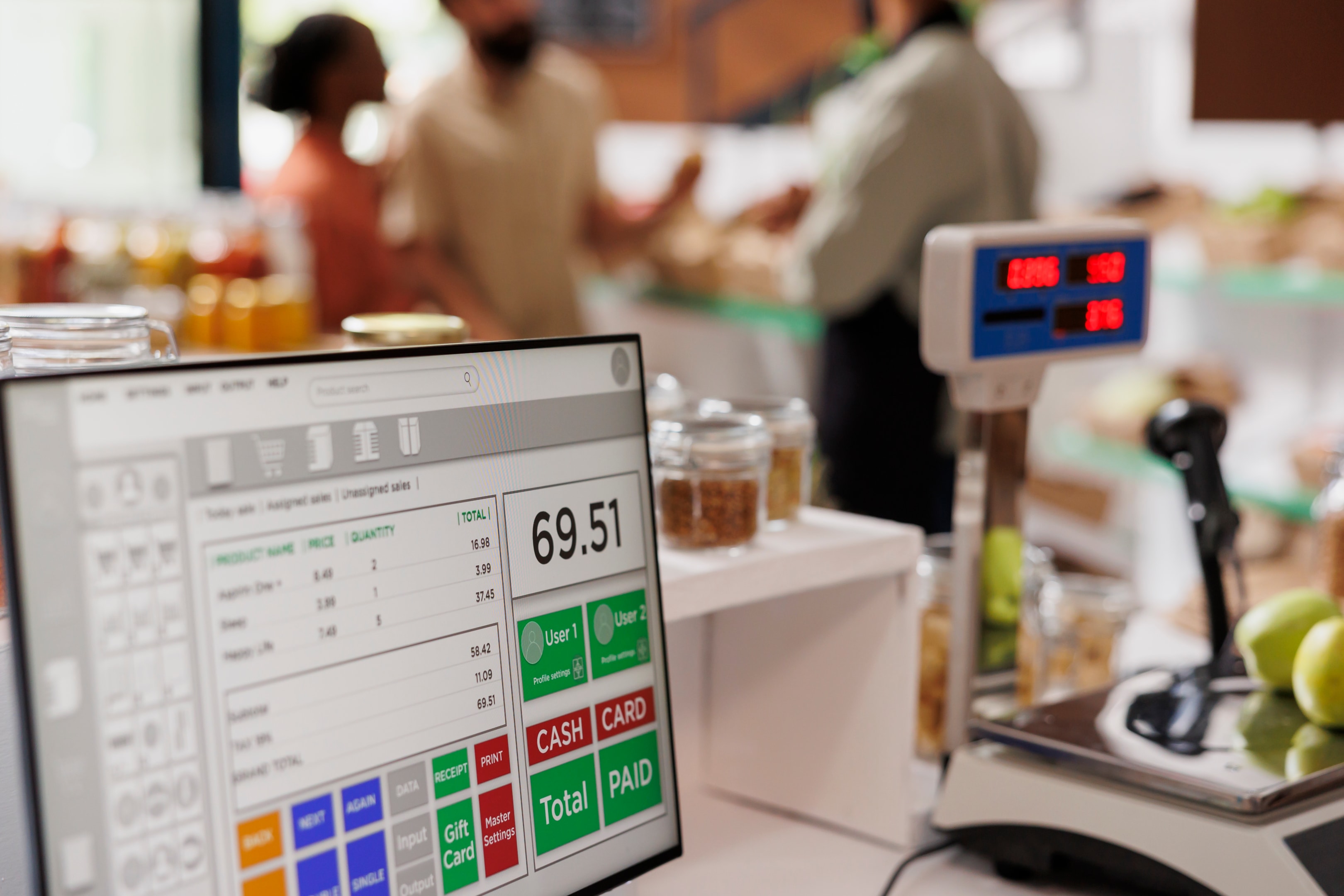
Shopify has long been a frontrunner in the POS software industry. It is known for its seamless integration between online and offline sales channels. It offers a comprehensive retail POS system that caters to small businesses and large enterprises.
Key Features:
- Cloud-Based POS Systems: Shopify’s POS system is entirely cloud-based, ensuring all data is synchronized in real-time across multiple locations. This feature mainly benefits businesses with multiple locations, enabling centralized inventory and sales data control.
- Inventory Management: Shopify excels in inventory management, offering advanced tools to track stock levels, manage orders, and predict future inventory needs based on sales data.
- Payment Processing: The platform supports various payment solutions, including credit card processing, online payments, and integration with multiple gateways. The built-in card reader simplifies payment processing for retail stores.
- Sales Reporting and Analytics: Shopify provides robust sales reporting capabilities, offering insights into sales trends, customer behavior, and product performance. These analytics tools help businesses make informed decisions to optimize their operations.
- Customer Relationship Management: Shopify’s POS system includes powerful customer relationship management features, allowing businesses to track customer data and purchase history and manage loyalty programs.
- E-commerce Platform Integration: Shopify’s POS solutions are tightly integrated with its e-commerce platform, enabling businesses to manage their online and offline sales from a single dashboard. This integration is vital for companies looking to streamline their operations and enhance customer experiences.
- Mobile POS System: The mobile POS capabilities allow businesses to process transactions anywhere within the store, enhancing the customer experience and reducing wait times.
- Third-Party Apps: Shopify supports integration with various third-party apps, allowing businesses to add functionalities as needed.
Square
Square has revolutionized how small and medium-sized businesses handle transactions with its user-friendly and affordable POS systems. Known for its flexibility and ease of use, Square is a top choice for many companies.
Key Features:
- Cloud Technology: Square’s cloud-based POS systems ensure all transaction data is stored securely and can be accessed from anywhere. This feature is essential for businesses that require mobility and flexibility.
- Sales Reporting and Analytics: Square provides comprehensive sales reporting tools that offer insights into sales trends, employee performance, and customer preferences. These tools are crucial for businesses looking to improve their operational efficiency.
- Payment Processing: Square offers various payment processing options, including credit card payments, online purchases, and mobile payments. The built-in card reader simplifies the checkout process.
- Inventory Management: Square’s inventory management features help businesses keep track of stock levels, set alerts for low inventory, and generate purchase orders automatically.
- Customer Relationship Management: Square includes features for managing customer data, creating customer profiles, and tracking purchase history. This data is valuable for businesses that build strong customer relationships and enhance loyalty programs.
Revel Systems
Revel Systems is a leading provider of POS solutions known for its powerful and flexible platforms. It caters to businesses of all sizes and offers many features to streamline operations and enhance customer experiences.
Key Features:
- Cloud Technology: Revel’s cloud-based POS systems ensure that all data is stored securely and can be accessed in real-time from any location. This feature is particularly beneficial for businesses with multiple locations.
- Inventory Management: Revel offers advanced inventory management features, allowing businesses to track stock levels, manage orders, and forecast future inventory needs.
- Sales Reporting and Analytics: Revel provides detailed sales reporting tools, offering insights into sales trends, customer behavior, and employee performance. These analytics tools help businesses make data-driven decisions to optimize their operations.
- Customer Relationship Management: Revel’s customer relationship management features allow businesses to track customer data, manage loyalty programs, and create targeted marketing campaigns.
- Payment Processing: Revel supports different payment solutions, including credit card processing, mobile payments, and integration with various payment gateways.

Factors to Consider When Choosing the Right Retail POS System
When selecting a point-of-sale system, businesses should consider their specific needs and the unique features offered by each provider. Key factors to consider include:
1. Business Needs
The specific needs of your business and your industry are fundamental considerations. Retail stores, restaurants, and service-based businesses have different requirements. For instance, a retail POS system needs robust inventory management features, while a POS system for the restaurant industry should have efficient table management and online ordering capabilities.
2. Scalability
As your business grows, your POS system should be able to scale with you. Look for POS solutions that can handle multiple locations and increase transaction volumes without compromising performance. Scalability also involves adding new features or integrating with other business tools as needed.
3. Integration Capabilities
A robust POS system should seamlessly integrate with your existing software and platforms, including e-commerce platforms, accounting software, and third-party apps. These integrations streamline operations and provide a unified view of your business, enhancing overall efficiency and decision-making processes.
4. Ease of Use
The ease of use of the POS software is critical for ensuring that your staff can quickly learn and efficiently operate the system. A user-friendly interface minimizes training time and reduces the likelihood of errors during transactions.
5. Cost
Consider the software costs, including the monthly fee and additional costs for hardware, integrations, or advanced features. Some POS providers offer flexible pricing plans that cater to businesses of different sizes and budgets. It’s also essential to assess whether the system can work with your existing hardware, such as receipt printers, cash drawers, and barcode scanners.
6. Customer Support
Reliable customer support is vital for addressing any issues with your POS system. Look for providers that offer comprehensive support services, including phone, email, and live chat support, as well as detailed documentation and tutorials.
7. Security
Security is a crucial aspect of any POS system. Ensure the provider offers robust security features, such as encryption, secure payment gateways, and compliance with industry standards like the Payment Card Industry Data Security Standard (PCI DSS).
8. Flexibility and Customization
Every business has unique requirements, and a one-size-fits-all approach may not work. Look for POS systems that offer customization options to tailor the system to your needs. This could include custom reports, loyalty programs, and personalized customer experiences.
9. Reporting and Analytics
Detailed sales reporting and analytics are essential for understanding your business performance and making data-driven decisions. Look for POS systems that provide comprehensive reporting tools, allowing you to track key metrics such as sales data, inventory levels, and customer behavior.

Key Benefits of Using Advanced POS Systems
The evolution of point-of-sale systems has brought numerous advantages to businesses across various industries. Advanced POS solutions offer a range of features that can significantly enhance operational efficiency and improve customer experiences. Here are some key benefits of using advanced POS systems:
Enhanced Inventory Management
Advanced POS systems come equipped with robust inventory management features. These tools allow businesses to track stock levels in real time, set automatic reorder alerts, and manage inventory across multiple locations. By having a clear view of inventory, businesses can reduce stockouts and overstock situations, leading to better cash flow management and improved customer satisfaction.
Improved Sales Reporting and Analytics
One of the standout features of modern POS systems is their ability to generate detailed sales reports and analytics. These insights help businesses understand sales trends, identify best-selling products, and make decisions on inventory and marketing. With real-time access to sales data, companies can quickly adapt to changing market conditions and optimize their operations for maximum profitability.
Streamlined Payment Processing
Advanced POS solutions support various payment methods, including credit card, mobile, and online payments. Integrated payment gateways ensure that transactions are processed quickly and securely, reducing customer wait times and minimizing the risk of payment fraud. Additionally, businesses can benefit from features like split payments, tipping, and loyalty program integration.
Better Customer Relationship Management
Effective customer relationship management (CRM) builds customer loyalty and drives repeat business. Modern POS systems offer integrated CRM tools that allow companies to collect and analyze customer data, track purchase histories, and launch targeted marketing campaigns. By understanding customer preferences and behavior, businesses can personalize their offerings and create more engaging customer experiences.
Increased Operational Efficiency
Automation is a crucial advantage of advanced POS systems. Features like automated inventory updates, employee management, and real-time data synchronization across multiple locations help streamline operations and reduce manual work. This increased efficiency allows staff to focus on delivering excellent customer service, ultimately enhancing the overall customer experience.
Scalability and Flexibility
As businesses grow, their POS systems need to scale accordingly. Advanced POS solutions are designed to accommodate growth, supporting additional registers, new locations, and increased transaction volumes. This scalability ensures businesses can continue to operate smoothly as they expand. Moreover, features like cloud technology and mobile POS systems provide the flexibility to adapt to changing business needs and environments.
Find the Perfect POS Systems for Your Business Needs
Choosing the right point-of-sale system is crucial for any business aiming to improve efficiency, enhance customer experiences, and drive growth. The POS systems from Shopify, Square, Revel Systems, Lightspeed, and Toast offer a range of features tailored to different industries and business needs. Whether running a retail store, managing a chain of restaurants, or overseeing a large enterprise, these POS platforms provide the tools and capabilities necessary to succeed in today’s competitive market.
Investing in a modern POS solution helps streamline sales management, inventory management, and payment processing and offers advanced tools for customer relationship management, sales reporting, and employee management. By leveraging the power of cloud-based POS software, businesses can ensure operational efficiency, data security, and scalability, positioning themselves for sustained success in 2024 and beyond. For enterprises transitioning from traditional POS systems, these modern solutions represent a significant upgrade in functionality and flexibility.
A professional and reliable business phone system is no longer a luxury for small businesses; it is necessary. Cloud-based, VoIP or virtual phone systems offer many advantages for small businesses, from flexibility and scalability to advanced features and cost-effectiveness. But with so many options available, choosing the best business phone system for your small business can be overwhelming.
This comprehensive blog will guide you through the current landscape of small business phone systems, highlighting some of the top providers and their key features to help you find the perfect fit for your needs. Whether you are looking for a solution that works seamlessly on a desktop or mobile device or integrates well with cell phone use, understanding the nuances of each provider will ensure you make an informed decision.

Why Modern Small Business Phone Systems Matter
Modern business phone systems offer a range of advanced features that go far beyond basic calling. These systems integrate with mobile devices, support team messaging, and provide voicemail transcription, call recording, and call forwarding. The shift from traditional phone lines to voice over internet protocol (VoIP) systems has opened up a world of possibilities, making it easier for small business owners to manage communications effectively.
By leveraging these business phone systems, small businesses can enjoy improved efficiency and enhanced customer service. The flexibility of accessing the phone system through various devices ensures seamless communication, whether employees are in the office or on the go. Additionally, features like call routing, unlimited calling, and video conferencing allow businesses to maintain a professional image and stay connected with clients and team members, ultimately supporting business growth and success.
Discover the Top Contenders: Tailored Solutions for Your Small Business
Several industry leaders offer feature-rich cloud-based solutions designed to meet the diverse needs of small businesses. Let’s explore two such providers in detail:
OpenPhone is another strong contender in the cloud-based phone system market. It is designed for startups and small businesses and boasts a user-friendly interface emphasizing team collaboration.
OpenPhone offers features like unlimited domestic calling (with pay-as-you-go international calling), a business phone number with custom greetings, call forwarding to route calls to mobile phones or voicemail, team messaging to facilitate internal communication, call recording with transcriptions, and mobile apps for Android and iOS devices. OpenPhone integrates with popular business tools like Slack and Salesforce, further streamlining workflows.
This powerful yet user-friendly cloud-based solution caters to small and medium-sized businesses. Talkroute offers a robust feature set, including unlimited domestic calling, a range of international calling options to fit your business needs, an auto attendant that professionally greets callers and directs them to the appropriate extension, a toll-free phone number to enhance your brand image, and provide a convenient way for customers to reach you, call recording to capture essential conversations for future reference, mobile apps, and desktop apps for seamless communication on the go or at your desk, and smart call routing to ensure calls are directed to the most qualified available team member.
Talkroute’s call queues ensure callers are not left on hold indefinitely, even during peak hours. With features like hold music and informative call queue announcements, Talkroute keeps callers engaged while they wait. Talkroute also offers integrations with popular business applications, streamlining your workflow and enhancing overall efficiency.

Key Features to Look for in a Small Business Phone System
When selecting a small business phone system, it is vital to consider the following features:
VoIP Phone System
Leveraging Internet protocol for calls ensures clarity and reduces costs. VoIP technology allows you to make high-quality voice calls over the Internet, which can be more cost-effective than traditional phone lines, especially for international calls. Businesses can benefit significantly from the flexibility and savings offered by VoIP phones.
Virtual Phone System
This allows employees to make and receive calls from anywhere. This flexibility means that your team can stay connected in the office, working remotely, or traveling, ensuring that business operations run smoothly no matter where they are.
Mobile Apps
Mobile apps enable access to the phone system on the go. They let your staff manage calls, messages, and contacts from their smartphones or tablets, providing the convenience of a business phone system that fits in your pocket.
Call Forwarding and Call Routing
These features ensure calls are directed to the appropriate person or department without delay, improving response times and customer satisfaction.
Unlimited Calling
Domestic and international calling options support business growth. Unlimited calling plans can predict costs, allowing you to communicate freely with clients and partners worldwide without worrying about per-minute charges.
Video Conferencing
It facilitates face-to-face meetings without the need for physical presence. Video conferencing is essential for maintaining personal connections and effective communication with remote team members, clients, and partners.
Automatic Call Recording
This feature records conversations for quality and training purposes. It is invaluable for monitoring customer interactions, ensuring compliance with regulations, and providing training materials for new employees.
Virtual Receptionist
Automates call handling with professional greetings and options. A virtual receptionist can answer calls, provide information, and direct callers to the appropriate person or department, presenting a polished and professional image to your clients.
Screen Sharing
It enhances collaboration during meetings and allows participants to view and discuss documents, presentations, and other visual aids in real time, making remote meetings more productive and engaging.
Business Phone Numbers
Provides local, toll-free, and virtual phone numbers to maintain a professional image. Offering a range of phone number options helps establish a local presence in different markets and gives customers convenient ways to reach your business.
How to Choose the Best Phone System for Your Business
Selecting the right small business phone system depends on various factors, including your business size, budget, and specific communication needs. Here is a guide to help you make an informed decision:
1. Evaluate Scalability: Ensure your chosen phone system can grow with your business. Both Talkroute and OpenPhone offer scalable solutions that can adapt to your expanding needs.
2. Simplify Ease of Use: A business phone system should be easy to set up and use. OpenPhone’s intuitive interface and Talkroute’s user-friendly features make them ideal choices for small businesses.
3. Consider Cost-Effectiveness: Consider your budget and look for VoIP business phone systems that offer the best value for money. Both Talkroute and OpenPhone provide cost-effective solutions with a wide range of features.
4. Integrate with Other Tools: Integrating with other business communications tools is essential. OpenPhone excels in this area, offering seamless integration with various software and applications.
5. Ensure Reliable Customer Support: Reliable customer support is crucial for any business phone service. Ensure the provider you choose offers excellent support to help you with any issues that may arise.

Choose the Best Phone System for Your Business Today
Finding the best phone systems for small businesses involves careful consideration of your communication needs and the features that will support your business growth. Both Talkroute and OpenPhone offer comprehensive, flexible, and scalable solutions that meet modern small businesses’ diverse needs.
Talkroute stands out with its advanced call routing, virtual receptionist, and extensive mobile and desktop integration. It provides a professional image with virtual phone numbers and offers excellent value with unlimited domestic calling.
Meanwhile, OpenPhone excels with its user-friendly interface, seamless integration capabilities, and rich features, including team messaging, call recording, and voicemail transcription. Its flexibility and focus on VoIP phone systems make it a top choice for small businesses looking to stay connected and competitive.
By understanding your unique needs and evaluating these top providers, you can choose the right business phone system to enhance your communication, improve efficiency, and contribute to your business’s success.
The way we conduct business communication has undergone a dramatic shift. Gone are the days of clunky, traditional phone systems. Today, businesses of all sizes embrace the flexibility and affordability of VoIP (Voice over Internet Protocol) services.
A VoIP service provider allows you to make and receive calls using your existing internet connection, eliminating the need for dedicated phone lines. This translates to significant cost savings, improved call quality, and many advanced features that can revolutionize your business communications.
But with many VoIP service providers vying for your attention, choosing the best one can take time and effort. This comprehensive guide will break down the key considerations, introduce you to some of the top players in the market, and ultimately help you find the best VoIP phone service for your specific needs.

Talkroute stands out as a versatile VoIP service provider catering to businesses of all sizes. Founded on the principles of simplicity and reliability, Talkroute offers a robust VoIP phone system designed to streamline business VoIP communications. Here is why Talkroute continues to be a top choice:
- Flexible Call Routing: Talkroute allows enterprises to efficiently route incoming calls to specific departments or employees, ensuring prompt customer service.
- Mobile and Desktop Apps: With dedicated mobile and desktop apps, users can stay connected from anywhere and effectively manage calls using desktop and mobile devices.
- Advanced Features: Beyond basic VoIP phone service, Talkroute offers advanced features such as call recording for quality assurance and voicemail transcription for streamlined message management.
- Excellent Call Quality: Leveraging high-speed internet connections, Talkroute ensures excellent call quality for crystal-clear business calls, which is essential for maintaining professional communication standards.
- 24/7 Customer Support: Talkroute’s commitment to customer satisfaction is evident in its responsive customer support, available 24/7 to address any issues or queries.
OpenPhone is revolutionizing VoIP services with its focus on simplicity and mobility. Ideal for businesses looking for a mobile-first VoIP phone service, OpenPhone offers:
- User-Friendly Interface: OpenPhone’s intuitive interface makes it easy for users to manage business communications effortlessly, whether on a mobile device or desktop.
- Mobile-Centric Approach: Recognizing the shift towards mobile work environments, OpenPhone ensures seamless integration with mobile apps for uninterrupted communication.
- Affordable Pricing: OpenPhone offers competitive pricing plans tailored for small to medium-sized businesses, making it an accessible choice without compromising call quality or features.
- Business-Centric Features: From auto attendant for professional call handling to voicemail transcription for efficient message retrieval, OpenPhone caters to diverse business communication needs.
- Scalability and Flexibility: As businesses grow, OpenPhone scales with them, offering scalable VoIP solutions that adapt to changing communication requirements seamlessly.

Factors to Consider When Choosing a VoIP Service Provider
Choosing the right VoIP service provider in 2024 is crucial for businesses aiming to enhance communication capabilities and streamline operations. Each provider offers unique strengths and solutions tailored to different business needs. Understanding these differences can help you make an informed decision that aligns with your organization’s seamless business VoIP integration goals.
So, here are the crucial factors you should know:
- Features: VoIP phone systems offer many features beyond simple voice calls. Look for functionalities like call forwarding, voicemail to text, call recording, video conferencing, unlimited calling plans, and integrations with your existing business apps.
- Scalability: As your business grows, your communication needs will evolve. Choose a provider that can scale with you, offering flexible plans and the ability to add or remove users seamlessly.
- Ease of Use: A VoIP system should be user-friendly for administrators and employees. Look for intuitive interfaces and readily available training resources.
- Cost: VoIP services offer significant cost advantages over traditional phone lines. However, pricing structures can vary greatly. Consider your budget and calling volume to find the most cost-effective plan.
- Reliability: Consistent, high-quality phone calls are a must. Choose a provider with a proven track record of uptime and excellent call quality.
- Customer Support: Prompt and helpful customer support is essential when encountering issues. Research the provider’s reputation for customer service.
Industry Trends in VoIP Services
The landscape of VoIP services is continually evolving with technological advancements and shifting market demands. In 2024, several key trends are shaping the industry:
Integration with AI
Many VoIP service providers are integrating artificial intelligence (AI) to enhance call routing efficiency, automate customer interactions, and improve voice recognition for more accurate voicemail transcription. AI-driven analytics also give businesses more profound insights into call quality and customer support metrics, enabling more strategic decision-making.
Security Enhancements
As businesses prioritize data security, VoIP providers implement robust encryption protocols and multi-factor authentication to protect business communications from cyber threats. With increasing concerns over data breaches, VoIP service providers are investing in advanced security measures like end-to-end encryption and regular security audits to ensure the integrity and confidentiality of voice calls and other business communications.
Hybrid Workforce Solutions
With the rise of remote and hybrid work environments, VoIP systems increasingly offer seamless integration across mobile devices, desktops, and collaboration platforms, supporting flexible work arrangements. Features such as interactive voice response (IVR), call forwarding, and virtual voicemail are becoming crucial for maintaining productivity and connectivity in diverse working environments. These solutions ensure employees can access business phone system functionalities from anywhere, using any device, enhancing operational flexibility and efficiency.
Focus on User Experience
User-centric design and intuitive interfaces are becoming standard among VoIP service providers, aiming to simplify setup and daily use for businesses of all sizes. Enhanced user interfaces and comprehensive support resources are being developed to reduce the learning curve associated with new VoIP systems. Additionally, VoIP providers focus on delivering excellent call quality and reliable performance to ensure a seamless communication experience for users, whether on mobile phones, desktops, or other mobile devices.

The Future of VoIP Technology
Looking ahead, VoIP technology is expected to evolve to meet the growing demands of businesses worldwide. Innovations in 5G technology promise to enhance VoIP call quality and reliability, particularly for mobile users. Furthermore, advancements in Internet of Things (IoT) integration may enable VoIP systems to interact seamlessly with smart devices, further bridging the gap between communication and automation.
As VoIP service providers explore new avenues for growth and improvement, businesses can expect even more robust VoIP solutions that integrate advanced features like augmented reality (AR) for remote assistance and real-time language translation during video conferences.
Take the Next Step in Business Communication with VoIP Phone Services
As businesses navigate the evolving business communications landscape, investing in a reliable VoIP phone service can significantly impact operational efficiency, customer satisfaction, and cost savings. Whether you opt for the simplicity of Talkroute’s small business-focused solutions or the mobile-centric innovation of OpenPhone, the best VoIP service providers in 2024 offer a range of features to suit diverse business needs. Businesses can leverage VoIP systems to foster seamless communication and sustainable growth in today’s competitive market by prioritizing call quality, flexibility, and integration.
The best business VoIP services provide excellent call quality and advanced features, ensuring scalability and integration with existing business apps. With the right VoIP phone provider, companies can empower their teams with the tools they need to collaborate effectively, serve customers efficiently, and confidently adapt to changing market dynamics. Explore the options available, consider your specific business requirements, and embrace the future of business communication with a trusted VoIP provider.
Efficient and cost-effective communication is crucial for business success. One key technology that addresses these needs is the IP phone system. Understanding an IP phone system and why businesses should adopt it can significantly impact their operational efficiency and bottom line.
An IP phone system (Internet Protocol phone system) uses the Internet for voice communication rather than analog phone lines. This system, called VoIP technology (Voice over Internet Protocol), converts analog voice signals into digital data packets transmitted over an IP network. Unlike traditional phone systems that rely on the public switched telephone network (PSTN), IP telephony Internet protocol leverages the Internet for phone calls.

Vital Components of an IP Phone System
Knowing the essential components of an IP phone system is crucial for effectively implementing this technology in your business. Here are the key elements that make up a robust IP telephony solution:
- VoIP Phones: These are the physical devices or software applications users use to make and receive calls over an IP network. VoIP phones work by converting voice into data packets.
- IP PBX: The IP PBX (Internet Protocol Private Branch Exchange) is a private telephone network used within an organization. It manages and routes calls between VoIP users and the public switched telephone network.
- Broadband Internet Connection: A reliable Internet connection is essential for an effective VoIP phone system. The connection quality directly affects the clarity and reliability of voice calls.
- VoIP Service Provider: The service provider offers the necessary infrastructure and services to connect IP phone systems to the PSTN and the Internet.
Why Businesses Need an IP Phone System
Adopting an IP phone system can revolutionize how businesses handle their communication needs. This modern technology offers numerous advantages over traditional phone systems, making it an essential tool for companies aiming to enhance efficiency and reduce costs. Here are some compelling reasons why an IP phone system is crucial for your business:
Cost Efficiency
One of the most significant advantages of IP telephony systems is cost savings. Traditional phone systems often have high installation, maintenance, and operational costs. In contrast, VoIP phone systems reduce these expenses by utilizing existing local area network infrastructure and offering lower call rates, especially for international calls.
Flexibility and Scalability
IP phone systems provide unmatched flexibility. Businesses can quickly scale their phone system as they grow, adding new lines and features without significant investment. This is particularly beneficial for startups and expanding enterprises.
Advanced Features
Modern IP phone systems are equipped with advanced features that enhance business communication. These include call routing, call recording, video conferencing, and unified communications platforms integrating various communication methods (voice, video, and instant messaging) into a single system.
Mobility and Remote Work
With the rise of remote work, IP telephony has become indispensable. Employees can use mobile devices or desk phones connected to the Internet to make and receive phone calls from anywhere, ensuring seamless communication regardless of location. This mobility is crucial for maintaining productivity in today’s hybrid work environments.
Reliability and Quality
VoIP systems have evolved to offer reliable and high-quality voice calls. A robust broadband Internet connection ensures clear and uninterrupted communication. Additionally, many VoIP providers offer unlimited calling plans, further enhancing cost-effectiveness.
Unified Communications
A significant benefit of IP telephony is integrating various communication tools into a unified communication platform. This integration allows businesses to streamline communication processes, improving efficiency and collaboration across teams.

Top IP Phone System Providers
When considering an IP phone system, choosing the right provider is crucial. Here are two leading VoIP services:
Talkroute offers a comprehensive VoIP provider designed for businesses of all sizes. It provides an array of features, including:
- Unlimited calling within the US and Canada can significantly reduce communication costs for businesses with a high call volume.
- Advanced call routing options that ensure calls are directed to the right person or department efficiently, improving customer satisfaction and operational efficiency.
- Integration with mobile devices and desk phones allows employees to make and receive calls seamlessly, whether in the office or on the go.
- VoIP calls with high-definition voice quality, ensuring clear and professional communication with clients and colleagues.
- Comprehensive call recording capabilities that help businesses maintain records for training, quality assurance, and legal compliance.
Talkroute’s platform is user-friendly and scalable, making it an excellent choice for businesses looking to enhance their communication infrastructure with minimal hassle. The system can be easily adapted to meet the needs of growing firms, ensuring long-term reliability and functionality.
OpenPhone is another top-tier VoIP service provider known for its flexibility and advanced features. Key offerings include:
- An easy-to-use app for mobile devices and desktops that allows users to manage their calls and messages effortlessly, improving productivity and communication efficiency.
- Integration with popular business tools and CRM systems, helping businesses streamline their workflows and improve customer relationship management.
- Advanced call routing and recording features ensure critical calls are never missed and all communications are accurately documented.
- High-quality voice calls over a reliable Internet connection, providing clear and uninterrupted communication, essential for professional interactions.
- Unlimited calling plans offer significant cost savings, particularly for businesses that make a high volume of domestic and international calls.
OpenPhone’s focus on simplicity and integration makes it ideal for startups and small businesses seeking a powerful yet straightforward VoIP system. The platform’s robust feature set and user-friendly interface make it easy to implement and use, ensuring companies can quickly benefit from improved communication capabilities.

How to Transition to an IP Phone System
Switching to an IP phone system can significantly enhance business communication but requires careful planning and preparation. Ensuring a smooth transition involves several critical steps, from assessing your needs to choosing the right equipment and training your staff. Below are key considerations and actions to help you successfully migrate to an IP phone system.
1. Assess Your Needs
Assess your business’s communication needs before transitioning to an IP phone system. Consider the number of users, required features, and budget constraints. This evaluation will help you choose the right VoIP provider and plan.
2. Ensure Network Readiness
A robust local area network and broadband Internet connection are vital for the success of your IP phone system. Ensure your network can handle the additional traffic and that your Internet connection is stable and fast enough to support high-quality voice calls.
3. Choose the Right Equipment
Select the appropriate VoIP phones for your business. Options range from desk phones and conference phones to softphones that run on mobile devices and computers. Ensure the chosen equipment meets your needs and integrates well with your existing systems.
4. Plan the Implementation
Develop a detailed implementation plan to transition smoothly from your traditional phone to an IP phone system. This plan should include timelines, employee training, and steps to ensure minimal disruption to your business operations.
5. Training and Support
Train your staff to ensure they understand how to use the new IP telephony system effectively. Also, choose a VoIP provider that offers excellent customer support to assist with any issues.
Embrace the Future of Business Communication with IP Phones
An IP phone system is a transformative technology that offers significant advantages over traditional phone systems. The benefits are substantial, from cost savings and advanced features to flexibility and support for remote work. By implementing a reliable VoIP service provider like Talkroute or OpenPhone and ensuring your network is ready, your business can transition smoothly to IP telephony and enjoy enhanced communication capabilities. Embracing VoIP improves efficiency and positions your company for future growth in an increasingly digital world.
Implementing an IP phone system is a strategic move that can revolutionize your business communication, making it more efficient, cost-effective, and adaptable to the evolving needs of the modern workplace. Whether you are a small startup or a large enterprise, shifting to Internet protocol telephony is a step towards a more connected and productive future.
Businesses continually seek ways to enhance their communication systems in today’s digital age. Customers expect prompt responses, efficient collaboration, and a professional experience across all touchpoints. Hence, VoIP phone service for business revolutionizes how companies handle business communications. It leverages the power of the Internet to deliver seamless, efficient, and cost-effective communication solutions.
VoIP (Voice over Internet Protocol) technology transforms regular phone calls into digital data packets that travel over your existing Internet connection. This eliminates the need for traditional landlines, offering many advantages for businesses of all sizes.
In this blog, we will explore the transformative impact of VoIP phone service for business and highlight the features and benefits of leading providers like OpenPhone and Talkroute. As companies continually seek ways to enhance their communication systems in today’s digital age, it’s clear that adopting VoIP technology is not just a trend but a necessity.
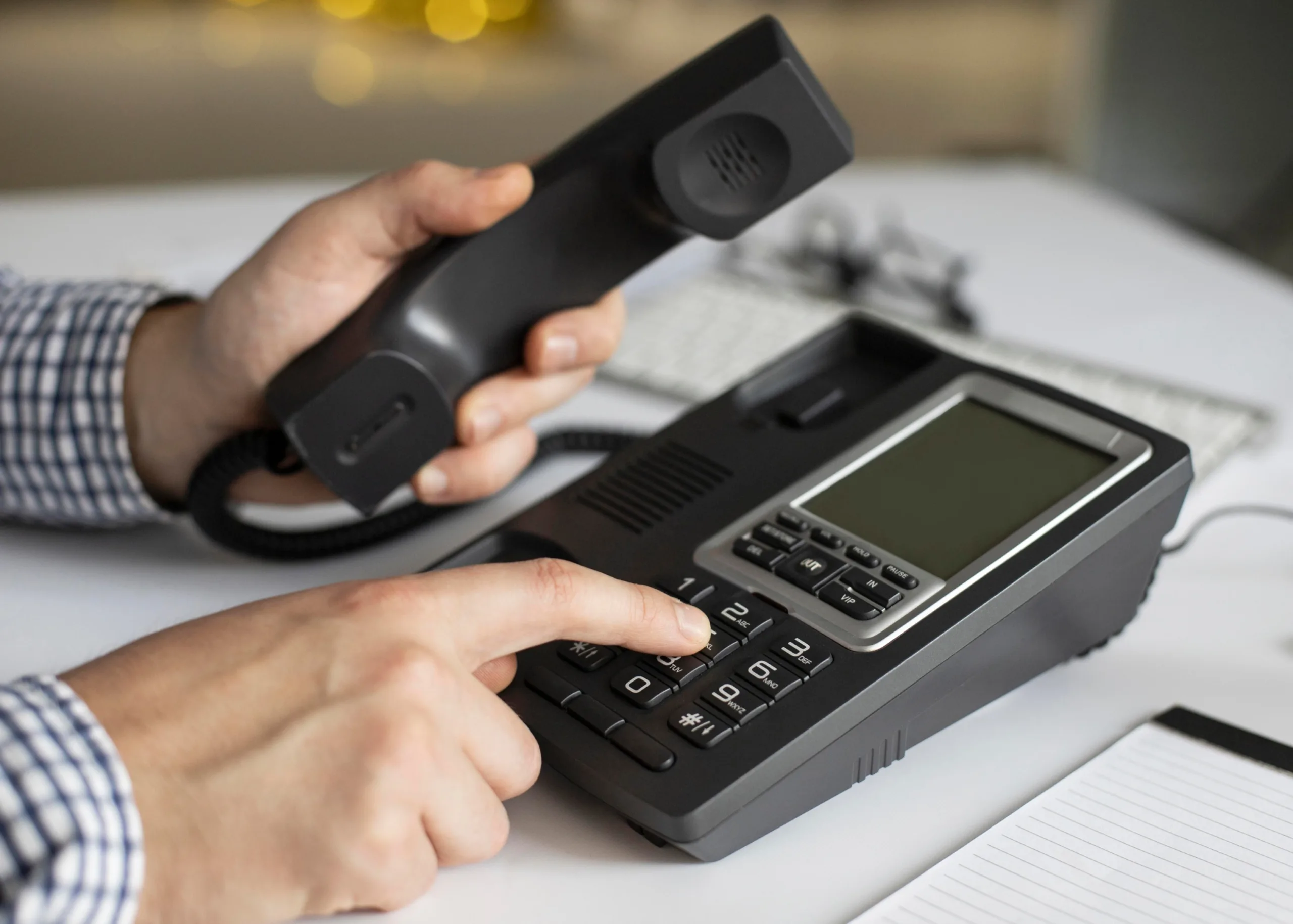
Why Choose a VoIP Phone System for Your Business
Unlike traditional landlines, a VoIP phone system uses the Internet to transmit voice calls. This method offers a range of benefits enticing to businesses of all sizes. With unlimited calling, call recording, and video conferencing, VoIP services provide a comprehensive solution for modern business needs.
Cost-Effectiveness
One of VoIP’s most significant advantages is its cost efficiency. Traditional phone lines can be expensive, especially for international calls. VoIP phone service minimizes these costs by using an existing Internet connection to make calls, reducing the need for separate phone lines and long-distance charges.
Flexibility and Mobility
In today’s work environment, flexibility is vital. VoIP systems enable employees to make and receive calls virtually anywhere using desktop and mobile devices. This flexibility ensures that business operations are not hindered by geographical limitations, promoting productivity and collaboration.
Advanced Features
VoIP services come with a plethora of advanced features that enhance business communications. Features like call forwarding, auto attendant, and unified communications streamline operations and improve customer service. These capabilities are not typically available with traditional phone systems, making VoIP a superior choice.
Unified Communications
Many VoIP service providers offer unified communications (UC) platforms that integrate voice calls, video conferencing, instant messaging, and other communication tools into a single interface. This fosters collaboration, improves team communication, and simplifies workflow.
Top-Rated VoIP Phone Service Providers
Let’s delve into two well-regarded VoIP service providers to understand how they can empower your business communications:
This cloud-based small business VoIP service provider boasts a user-friendly interface, mobile app, and comprehensive features, including unlimited calling within the US and Canada, voicemail transcription, call routing, and auto attendants. OpenPhone is ideal for startups and small teams seeking a straightforward, budget-friendly VoIP solution.
A popular choice for businesses of all sizes, Talkroute offers a robust and scalable VoIP system with a feature-rich set of functionalities, such as forwarding, voicemail to text, integrations with popular CRM tools, and international calling options. Talkroute’s pay-as-you-go pricing structure also appeals to businesses with fluctuating call volumes. Additionally, Talkroute offers a user-friendly mobile app that allows employees to seamlessly make and receive business calls on the go, further enhancing communication flexibility.

Essential Factors When Choosing the Right Business VoIP System
With a vast array of business VoIP services, selecting the right one for your business needs is crucial. Here are some key factors to consider:
- Number of Users: Determine the number of employees who require phone lines. Most providers offer tiered plans based on user count. Consider future growth projections and choose a plan to accommodate your scaling needs.
- Calling Needs: Analyze your calling patterns to understand the volume and destination of your calls. Do you primarily make local calls or require frequent long-distance or international calling capabilities? Choose a plan that caters to your specific usage patterns to avoid incurring unnecessary charges.
- Features Required: Identify the essential functionalities to streamline business operations and enhance customer service. Common features include call recording for training and quality assurance purposes, call forwarding to ensure you never miss important calls, voicemail transcription for improved accessibility, and auto attendants to greet callers professionally and direct them to the appropriate department. Consider features like video conferencing and audio conferencing if team collaboration is a priority for your business.
- Budget: Set a realistic budget for your VoIP phone service. VoIP service providers offer a range of pricing plans with varying features and functionalities. Compare plans and features across different providers to find the best value for your business. Consider hidden costs such as setup fees and per-minute charges for exceeding included call minutes.
Critical Steps in Making a Switch to VoIP Business Phone System
Transitioning to a VoIP phone system can be a breeze with the proper preparation and support. Many VoIP service providers understand the importance of a smooth transition and offer comprehensive assistance. Here is a detailed breakdown of what you can expect:
1. Selecting the Right VoIP Provider
The first step is choosing a VoIP service provider that perfectly complements your business needs and budget. Carefully evaluate different providers by researching their features, pricing plans, scalability options, and customer support reputation. Consider the number of users you require phone lines, your typical calling patterns (local, long-distance, international), and the specific functionalities that will enhance your business operations and customer service. Don’t hesitate to contact potential providers with any questions you may have.
2. Porting Your Existing Phone Numbers
In most cases, you can seamlessly transition your existing business phone numbers to your new VoIP system. This eliminates the need to inform your clients and partners about a change in contact information, minimizing disruption to your business. Your chosen VoIP service provider will typically handle the porting process for you, ensuring a smooth transition and uninterrupted communication.
3. Setting Up Your VoIP System
Depending on your chosen provider, you might receive physical VoIP phones for your office or utilize a desktop app to make and receive calls on your computer. Many providers offer both options, allowing you to choose the setup that best suits your work environment and employee preferences. Additionally, mobile apps are a standard feature with most VoIP phone services. This empowers your team to seamlessly manage business calls from their smartphone, mobile device, or tablet, promoting remote work capabilities and enhanced communication flexibility.
4. Employee Training and Familiarization
Once your VoIP system is set up, providing basic employee training is crucial. This will familiarize them with the new system’s interface, functionalities, and features. Depending on your company’s size and learning preferences, training can be conducted in person, through online tutorials, or a combination. By ensuring your team is comfortable navigating the new system, you can maximize its benefits and minimize any initial hiccups.
5. Ongoing Support and Maintenance
Most VoIP service providers offer ongoing support to ensure the smooth operation of your system. This may include troubleshooting assistance, feature updates, and security patches. Familiarize yourself with the support channels offered by your provider and encourage your employees to reach out for help if they encounter any difficulties using the new system.

Take Your Business Communications to the Next Level with VoIP Phone Service
Switching to a small business VoIP phone service can significantly enhance your company’s communications, offering flexibility, advanced features, and cost savings. Both OpenPhone and Talkroute provide excellent business VoIP services, each with unique strengths tailored to different business needs.
OpenPhone’s simplicity, seamless integration, and affordability make it ideal for small businesses and startups. On the other hand, Talkroute stands out with its comprehensive feature set, scalability, and versatility, which make it suitable for both small and large enterprises.
Choosing the right business VoIP system involves evaluating your business size, feature requirements, budget, and the reliability of the VoIP service. Considering these factors, you can select a business VoIP provider to enhance your business communications and support your growth.
Gone are the days when phone calls were solely confined to traditional landlines. Today, the world of communication has embraced a revolution: Voice over Internet Protocol (VoIP). But what exactly is VoIP, and how does it work?
Simply put, VoIP enables voice calls using broadband internet instead of traditional phone lines by converting your voice into digital data packets transmitted over the Internet. This digital transmission offers many benefits, making VoIP a compelling alternative to traditional phone systems.
This comprehensive guide will equip you with all the essential knowledge about VoIP technology, its benefits, and how it can transform your communication landscape.

Understanding the Essence of Voice over IP
VoIP, also known as Internet telephony, is a technology that allows you to make and receive telephone calls using a broadband Internet connection instead of traditional phone lines. VoIP converts your voice into digital data packets and transmits them over the Internet protocol (IP) networks. This method of communication is not only cost-effective but also offers a plethora of features that are not available with traditional telephone services.
How Does VoIP Work
To grasp what is VoIP, it is essential to understand the underlying technology. Here is a step-by-step breakdown of how VoIP calls are made:
1. Signal Conversion
When you speak into a VoIP phone or IP phone, your voice is converted into digital data. This process involves converting analog sound waves into digital signals that can be transmitted over the Internet.
2. Data Packet Transmission
These digital signals are broken down into small, often called VoIP packets. Each packet contains a portion of the audio data and routing information to ensure it reaches the correct destination.
3. Internet Transmission
The packets are sent to the recipient’s device over the Internet connection. This transmission occurs through various routers and switches that direct the packets along the most efficient path.
4. Reassembly
The packets are reassembled at the destination, and the digital data is converted into voice signals. Advanced algorithms ensure that packets arrive in the correct order and are reassembled seamlessly, providing clear and uninterrupted audio.
Protocols such as the session initiation protocol (SIP) facilitate this process, which manages the setup, management, and termination of VoIP calls.
Critical Advantages of VoIP Services
The shift from a traditional phone system to VoIP offers many advantages for individuals and businesses. Here is a glimpse into what makes VoIP such a compelling choice:
- Cost Savings: VoIP service providers often offer competitive rates, especially for international calls. Since VoIP bypasses traditional phone networks, you can potentially save significant amounts compared to landline phone service.
- Enhanced Features: VoIP systems typically come bundled with numerous features, such as voicemail, call forwarding, caller ID, and even video conferencing capabilities, all accessible through a user-friendly interface.
- Flexibility and Mobility: Unlike traditional phone lines that tether you to a physical location, VoIP allows you to make and receive calls from virtually anywhere with a strong internet connection. This makes it ideal for remote workers, mobile professionals, and geographically dispersed teams.
- Scalability: VoIP solutions are incredibly scalable, allowing businesses to add or remove phone lines as their needs evolve quickly. This eliminates the need for expensive infrastructure upgrades often associated with traditional phone systems.
- Unified Communications: Many VoIP systems integrate seamlessly with other communication services, such as instant messaging, video calls, and email, creating a unified platform for streamlining communication and collaboration.

Exploring Popular VoIP Providers
With the growing popularity of VoIP, numerous service providers have emerged, each offering unique features and pricing plans. Here, we will delve into two prominent options to help you navigate the VoIP landscape:
Talkroute is a popular VoIP provider known for its user-friendly interface and robust feature set. It is designed for small businesses and offers a range of VoIP solutions, including call routing, caller ID telephony, and call recording. With Talkroute, companies can manage their communications effectively with minimal setup.
Key Features:
- Virtual Phone Numbers: Choose local or toll-free numbers.
- Call Management: Advanced call forwarding, call routing, and voice mail.
- Integration: Compatible with various mobile devices and desktops.
OpenPhone is another excellent VoIP service provider for modern businesses. It offers seamless integration with other business tools, making it ideal for teams. OpenPhone provides features like call recording, caller ID, and unified communications that enhance productivity and streamline communication.
Key Features:
- Team Collaboration: Share phone numbers among team members.
- Custom Greetings: Set up professional greetings and call handling.
- App Integration: Integrates with Slack, Google Contacts, and more.
Discover the Capabilities of VoIP Systems
VoIP technology extends far beyond simply making and receiving phone calls. Here are some additional functionalities that enhance communication and collaboration:
- IP Phones: Dedicated VoIP phones offer a familiar phone-like experience with additional features like call conferencing and integrated voicemail capabilities.
- Analog Telephone Adapter (ATA): An ATA allows you to connect a traditional phone to a VoIP system, enabling you to use your existing phones with VoIP technology.
- Mobile VoIP Applications: Many VoIP service providers offer mobile apps allowing you to make and receive calls directly from your smartphone or tablet, maximizing flexibility and on-the-go accessibility.
- Web Conferencing: Certain VoIP systems integrate web conferencing capabilities, allowing you to conduct video meetings directly from your VoIP interface, streamlining communication and collaboration.
By leveraging these advanced functionalities, VoIP systems can transform your business’s communication, fostering collaboration and enhancing overall productivity.

The Future of VoIP Systems
As Internet access becomes more widespread and broadband connections improve, the adoption of VoIP technology is expected to increase. Innovations in VoIP services will likely focus on enhancing call quality, integrating with other communication services, and providing more robust security features. The shift towards unified communications and the growing remote work trend will further drive the demand for VoIP solutions.
- AI and Automation: Incorporating artificial intelligence in VoIP services will enable features like intelligent call routing, automated transcriptions, and real-time language translation.
- 5G Technology: The rollout of 5G networks will provide faster and more stable Internet connections, further improving the performance and reliability of VoIP phone systems.
- Unified Communications (UC): VoIP systems increasingly integrate with other communication services like email, video conferencing, and instant messaging, creating a unified platform for seamless collaboration.
- Enhanced Call Quality: Ongoing compression algorithms and network infrastructure improvements will result in more precise and reliable voice calls.
- Greater Integration: VoIP systems will increasingly integrate with other communication services, such as email, instant messaging, and video conferencing, to provide seamless, unified communications.
- Advanced Security Features: As cyber threats evolve, VoIP providers will focus on developing more robust security measures to protect against data breaches and ensure the privacy of VoIP calls.
- Increased Mobility: With the rise of remote work, VoIP technology will continue to enhance its mobile capabilities, allowing users to make and receive telephone calls on any computer or mobile device anywhere in the world.
Make the Switch to VoIP Today
Understanding what is VoIP and its numerous advantages can help you make informed decisions about your communication needs. Whether you’re a small business looking for cost-effective VoIP solutions or a large enterprise needing a robust VoIP phone system, there’s a VoIP provider out there to meet your needs. Providers like Talkroute and OpenPhone offer tailored solutions that enhance business communications, improve flexibility, and reduce costs.
Switching to VoIP modernizes your communication infrastructure and prepares your business for future technological advancements. With the right VoIP service provider, you can enjoy seamless, high-quality voice calls, extensive features, and the flexibility to adapt to the changing landscape of business communications. VoIP technology provides a versatile, efficient, and economical way to communicate in the digital age, whether for personal use, business, or remote work.
Blog Categories
- BUSINESS
- CRM
- Website Builders
- Hosting Services
- Legal Services
- Project Management Software
- VoIP
- POS
- Payroll
- Merchant Services
- Accounting Software
- Digital Marketing Software
- Tax Services
- Antivirus
- Email Marketing
- FINANCE
- INSURANCE
- HOME & GARDEN
- Internet Providers

